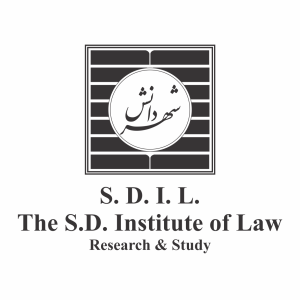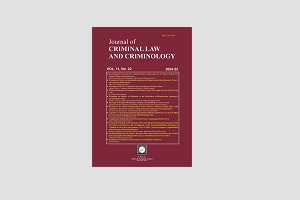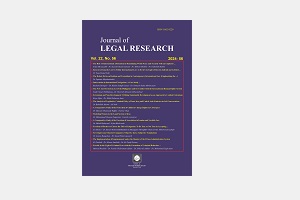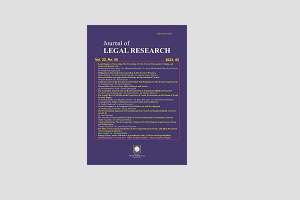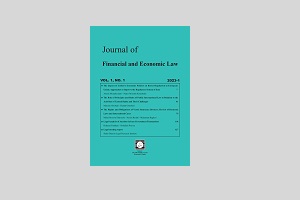Journal of
Criminal Law and Criminology
Number 5
Vol. III ● No. 1
Spring – Summer 2015
Managing Editor: Vahid Eshtiagh
Editor-in-Chief: Mohammad Ashoori
CONTENTS
Articles
Juvenile Police, Requirements and Mechanism in Iran (A Comparative Study: American Legal System)
Hassan-Ali MOAZEN ZADEGAN (Ph.D.) & Hossein JAVADI
Protection of Children in Judicial and Non Judicial Mechanisms of Criminal Prosecution of Violation of Their Rights
Reza ESLAMI (Ph.D.) & Forouzan BAGHERI
Legality: Positivistic Foundation of the Penal Institutions in International Law
Aramesh SHAHBAZI (Ph.D.)
The Comparison of the Search and Inspection in the Criminal Procedures of Iran and the U.S.A.
Gholam-Hassan KOOSHKI (Ph.D.) & Sahar SOHEIL MOGHADAM
The Necessity of Avoidance of Human Rights Violations during the Extradition
Seyed Ghasem ZAMANI (Ph.D.) & Fereshteh BAGHERI
Khoonsolh; dealing with Murder in a Traditional Manner
Hossein GHOLAMI (Ph.D.) & Hossein MORADGHOLI
Articles
Juvenile Police, Requirements and Mechanism (A Comparative Study: American Legal System)
Hassan-Ali MOAZEN ZADEGAN (Ph.D.)
Associate Professor of Criminal Law and Criminology, Allameh Tabataba’i University
&
Hossein JAVADI
Phd student of Criminal Law and Criminology, Allameh Tabataba’i University
Abstract:
With the passing the age of integrated criminal policy that Considers criminal actors as a unit Elements, Criminal justice systems have attempted to enhance the efficiency and effectiveness of the actions According to the distinctions between different human groups based on the physical and psychological Elements in the field of prevention and response to the criminal phenomenon. One of the aspects of this approach can be seen in Different proceedings in relation to children and adolescents. Now under numerous international conventions Such as Convention on the Rights of the Child (1989) and United Nations Standard Minimum Rules for the Administration of Juvenile Justice (1985), many countries have forecasted special rules in relation to juvenile delinquency and victimization. Juvenile police is a One of the specific institutions In relation to juvenile justice system. Although with the use of juvenile Officer the police can improve the performance of the it’s Organization and the criminal justice system in relation to children and young people. But the results of this study show that Formation of the Police without regard to the specific requirements of this age group and without the use of special mechanisms is not effective and eventually causing the obesity and reduce the Performance of police organization. A comparative study in various countries, especially in America shows juvenile police Requires the Changing in the organizational structure, Create the Systematic educational system, Forecast the Communicational and behavioral effective mechanisms, use of special interview process, Forecast police sanctions And adopt police prevention mechanisms. Accordingly, due to the importance of the issue and it’s emerging in Iranian criminal justice system this study Deal with legislative developments in relation to the juvenile police in the international arena as well as in Iranian and America legal system.
Keywords: special proceedings, law enforcement, judicial police, juvenile police.
Protection of Children in Judicial and Non Judicial Mechanisms of Criminal Prosecution of Violation of Their Rights
Reza ESLAMI (Ph.D.)
Corresponding author, Assistant professor of Human Rights,
Shahid Beheshti University
&
Forouzan BAGHERI
MA student of Public International Law
Abstract:
Today’s crimes target children for the worst possible violence and abuse. It is our shared duty to protect of children’ rights.. There is a need to strengthen the commitment to end impunity for crimes committed against children, in particular by adopting concrete measures to encourage international criminal justice as a judicial mechanism and truth-seeking mechanisms to place more emphasis on the experiences of children and to involve children in their work. With the establishment of the International Criminal Court, the ad hoc Tribunals, and the Special Court and the Truth and Reconciliation Commission for Sierra Leone, there is an opportunity for all those working in the areas of children’s rights and international criminal justice to ensure that crimes committed against children are being addressed. to end to impunity for crimes against children we should sure that accountability mechanisms address crimes against children, through investigation of crimes, prosecution of perpetrators and redress for the victims; Develop child-friendly procedures for children’s involvement in truth and justice-seeking mechanisms. The lack of such papers is obvious. Protection of children in judicial and non judicial mechanisms is the one of the important issues at international law that theoretical studies are necessary in this case.
Keywords: protection of children’ right, prosecution of violations of children’s rights, judicial mechanism, non judicial mechanism.
Legality: Positivistic Foundation of the Penal Institutions in International Law
Aramesh SHAHBAZI (Ph.D.)
Assistant Professor of International Law, Allameh Tabataba’i University
Abstract:
Positivism is distinct from natural law theories in that it holds that there is no necessary conceptual connection between law and morality, but Positivism sometimes has been diminished into pure formalism. While Formal procedures of formation of the rules and institutions in international law could be considered as a formalistic aspect of positivism, positivism may also enter into foundational frameworks in which the norms and the procedures could be formed. In this context the positivistic aspect of creation of legal institutions in international criminal law could be considered as an important element in evaluation of the legality of institutions. The principle of non-retroactivity of obligations, doctrine of act of State and the superior order are some of the relevant examples. In this article by focusing on the legal foundations for formation of the criminal institutions in international law, we will consider whether the Nuremberg was a legal criminal institution in international criminal law and how it is possible to generalize the criteria of legality to other international criminal institutions.
Keywords: legality, positivism, Nuremberg, legitimacy, formalism, International Criminal Law, criminal justice.
The Comparison of the Search and Inspection in the Criminal Procedures of Iran and the U.S.A.
Gholam-Hassan KOOSHKI (Ph.D.)
Assistant Professor in Criminal Law and Criminology, Allameh Tabataba’i University
&
Sahar SOHEIL MOGHADAM
Corresponding author, MA student of Criminal Law and Criminology,
Allameh Tabataba’i University
Abstract:
Considering the right to privacy or the privacy of individuals is one of the prominent human rights in any society. One of the action in that will be considered as a violation of privacy is “search and inspection”. Given the exceptional nature of this action, it is essential to determine the boundaries of this action in the rules of criminal procedure. According to the principle of “non-entry into the privacy of the persons” and the absolute lack of this right, justice system in both Iran and America, in addition to guaranteeing this right, in order to provide public order and interests, they explained the license ways to restrict such. In both the judicial system, inspection and search, subject to the permission of the judicial authority, except in cases of necessity, such as in an obvious crime. However in America’s legal system in addition to the obvious crimes, for clear and immediate danger when the police authorities have the right to inspect and search. In the America’s legal system, contrary to Iranian law, clear rules for search and inspection of vehicles allocated. One of the distinctive aspects of the American legal system in this context is not only related to past crimes and evidence inspection, but also by assigning special arrangements such as the search and expected or pre-emptive inspection to discover the crime. On the other hand, in both the legal system, appropriate guarantees, such as criminal and civil enforcement are dedicated. However, in America’s legal system exclusionary rule has dedicated. This matter act as an essential step in ensuring that the rules and hearing procedures is proceeding.
Keywords: search and inspection, the right to privacy, the Code of Criminal Procedure; Iran and America law.
The Necessity of Avoidance of Human Rights Violations during the Extradition
Seyed Ghasem ZAMANI (Ph.D.)
Associate Professor of International Law, Allameh Tabataba’i University
&
Fereshteh BAGHERI
Ph.D. Student of International Law, Shahid Beheshti University
Abstract:
Offender’s extradition is one of the earliest forms of judicial assistance in the context of criminal issues. However in the case of human rights violation, states are obliged to refrain from extradition to the countries that violate fundamental human rights. Whenever human rights violation is imminent, the specific context of extradition offers states a number of ‘avoidance techniques’.
First of all, states have simply alleged that ‘the principle of confidence’ or ‘the rule of non-inquiry’ impedes them from probing into the requesting state’s administration of criminal justice. Secondly, states have relied on their counterparts’ assurances that they will abide by accepted standards and will observe the fugitive’s fundamental rights, including that he or she will not be tortured, that he or she will receive the benefits of a fair trial, and that he or she will not be exposed to capital punishment. Thirdly, states have been placated by the other state’s guarantee that even if the person’s human rights were to be infringed, he or she would be entitled to obtain redress, either by starting appellate proceedings in a domestic court or by submitting a complaint to an international human rights body. Fourthly and finally, states may require the fugitive to hand over abundant evidence buttressing his or her apprehensions, preferably including proof that he or she has been targeted or maltreated before.
Keywords: offender’s extradition, human rights, the rule of non-inquiry, guarantee, compensation, evidence.
Khoonsolh; dealing with Murder in a Traditional Manner
Hossein GHOLAMI (Ph.D.)
Associate Professor of Criminal Law and Criminology, Allameh Tabataba’i University
&
Hossein MORADGHOLI
Corresponding author, MA in Criminal Law and Criminology,
Allameh Tabataba’i University
Abstract:
Khoonsolh is an especial ritual in response to murder which is still applied in some parts of the country along with official criminal investigation; areas where ethnic and tribal roots and characteristics of traditional societies are still tangible. In the traditional structure of such societies which embedded ethnic prejudice and belief in private justice, a murder might cause perpetration of variety of different crimes. In this regard, it should also be added that in addition to the individual identity of each person, tribal system has a collective identity as well. Due to the high cohesion of such communities, a crime against a person is considered an aggression towards all the members of the given community. Hence, the aftermath of murder will be the division of people into two groups: offender and victim. The consequence of such gap in the society would be the perpetration and continuity of various crimes against each other by these groups. In such circumstances, Khoonsolh can restore the shattered social relationships and prevent the possible future crimes through the participation of local community, heirs of the victim, murderer and his/her kin. In this article we have attempted to investigate the process along with embarking on the geographical domain and the functions of Khoonsolh ceremony. The main achievement of current study is proving the proportionality of given ritual to the restoration and revival of shattered relationships between the parties and prevention of crime.
Keywords: Khoonsolh, Khoonbas, local community, restoration, prevention of crime.
